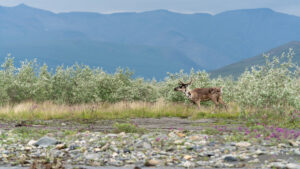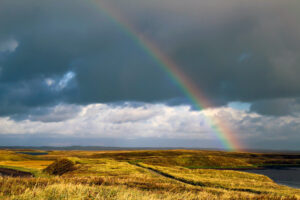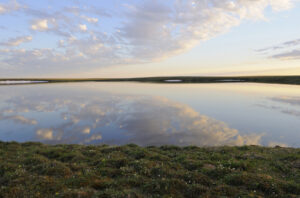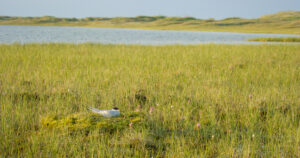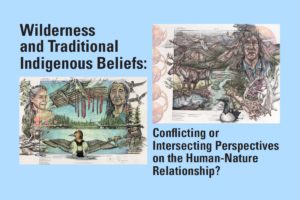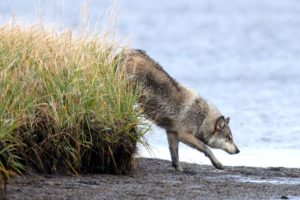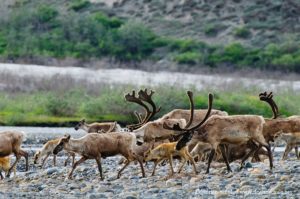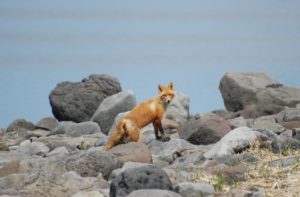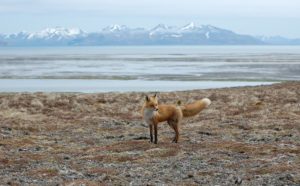IZEMBEK REFUGE
Photo credit: U.S. Fish and Wildlife Service, Kristine Sowl
WHY TO LOVE THIS PLACE
The Izembek National Wildlife Refuge is 310,000 acres of land on the Alaska Peninsula located between the Bering Sea and the Gulf of Alaska. Despite its remote location and distinction as the state’s smallest national wildlife refuge, Izembek is home to one of the most ecologically unique of Alaska's refuges that protects a wide variety of fish and wildlife species and their habitats.
LOCATION

WILDERNESS
The federally designated Izembek Wilderness makes up nearly the entirety of Izembek National Wildlife Refuge.
HONK HONK!
The entire world population of emperor geese (approx. 70,000) migrates through Izembek Refuge each spring and fall.
CARIBOU
The Southern Alaska Peninsula caribou herd moves from its calving grounds north of the refuge to Izembek in late fall to spend the winter.
DINNER BELL
During peak salmon runs, as many as nine bears per mile have been observed along Izembek’s salmon-rich streams.
WILDLIFE EVERYWHERE
More than 200 species of wildlife and nine species of fish can be found in Izembek Refuge.
THE FIGHT TO PROTECT THE IZEMBEK WILDERNESS
Commercial and private interests have for decades advocated for a road through the heart of Izembek Wilderness in order to build a road connecting the town of King Cove with the village of Cold Bay.
Under the Obama administration, following three years of study at a cost of $3 million, the U.S. Fish and Wildlife Service concluded that the proposed road through Izembek Refuge was unnecessary, not in the public’s best interests, and harmful to the refuge lands and wildlife. The agency made a scientifically and legally sound assessment that a road through federally designated wilderness within Izembek Refuge would irreparably harm wetlands of international importance to migratory waterfowl and other important wildlife species and have major negative effects on certain bird species and brown bears.
Under the Trump administration, the U.S. Department of the Interior made repeated attempts to push through a land swap intended to trade Izembek Wilderness lands to make way for that road. A deal for a land exchange was made in 2018 by then-Interior Secretary Ryan Zinke, only to be thrown out in court. A similar deal struck in 2019 by then Interior Secretary David Bernhardt was also tossed by the district court.
In 2021, the U.S. Department of Justice under President Biden filed a legal brief in the Ninth Circuit Court of Appeals defending the 2019 land exchange between the Interior Department and King Cove’s Alaska Native village corporation. The Ninth Circuit overturned the district court and reinstated the exchange, and the League and our allies have filed for an en banc hearing.
In November 2024, the Department of the Interior released a draft supplemental environmental impact statement reviewing a land exchange within Alaska’s Izembek National Wildlife Refuge. If this proposed exchange moves forward, it could fast-track the privatization of lands through designated Wilderness for a road corridor, contrary to the process established by the Alaska National Interest Lands Conservation Act (ANILCA) – Alaska’s landmark conservation law – for such large decisions.
“We are deeply concerned to see this administration revisit such a flawed approach to approving a road corridor through Wilderness in Alaska,” said Kristen Miller, Executive Director of Alaska Wilderness League.
“ANILCA was created to protect public lands from rapid development and privatization. By disregarding ANILCA’s protections, this decision could mark the beginning of a vast erosion of protections for some of Alaska’s most essential Wilderness areas, National Parks, and National Wildlife Refuges — areas renowned for their biodiversity and cultural importance.”
LATEST IZEMBEK HIGHLIGHTS
What Public Lands will Alaska Have Left Once Trump is Through with Them?
In just nine months, Trump has taken brash and inconceivable moves to open Alaska’s public lands to industrialization. From roads that could rip through Gates of the Arctic National Park, to opening the Arctic Refuge’s coastal plain to drilling, and offering up Special Areas on a buffet table to oil and gas companies, it’s clear…
National Wildlife Refuge Week: The Meaning of Refuge
This National Wildlife Refuge Week, we’re celebrating Alaska’s Izembek, Kenai, and Arctic wildlife refuges and highlighting the need to protect them.
Proposed Land Exchange in Izembek National Wildlife Refuge Raises Legal Questions
Today the Department of the Interior published a Notice of Intent to prepare a supplemental environmental review of a possible land exchange involving Alaska’s Izembek National Wildlife Refuge for a road.
Alaska Wilderness League Welcomes Action to Protect Izembek National Wildlife Refuge
FOR IMMEDIATE RELEASE March 13, 2023 Contact: Aileo Weinmann | aileo@alaskawild.org Alaska Wilderness League Welcomes Action to Protect Izembek National Wildlife Refuge“Alaska’s public lands and waters can provide for current and future generations only if they are protected from irreversible harm” Washington, D.C. – Alaska Wilderness League welcomes Interior Secretary Deb Haaland’s announcement today withdrawing…
Wilderness and traditional Indigenous beliefs
Indigenous people had no word for Wilderness. What are the implications of this increasingly noted fact?
Izembek is a wildlife spectacle, even by Alaskan standards
As the debate over a proposed road through the heart of the Izembek National Wildlife Refuge continues, we recognize this wilderness as the wildlife sanctuary it is.
Biden opens the door to protecting the Arctic Refuge
This piece originally appeared in The Hill. (Cover photo: Porcupine caribou on the coastal plain of the Arctic National Wildlife Refuge — Florian Schulz/www.florianschulz.org)
North To The Future: Alaska And The Risks Of Pursuing A Trump Legacy
(This blog originally appeared on the American College of Environmental Lawyers website.) On the last Friday in March, Judge Sharon Gleason of the Federal District Court for the District of Alaska issued two opinions in closely-watched cases* concerning federal public lands and waters in and offshore of Alaska.
Beautiful And Remote, The Izembek National Wildlife Refuge
Located on the coastal side of the central Aleutians East Borough, the beautiful and remote Izembek National Wildlife Refuge was established more than three decades ago to conserve an important habitat for migratory birds, brown bears and salmon, as well as other wildlife.

